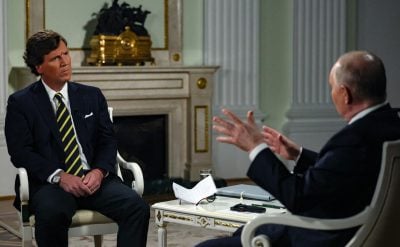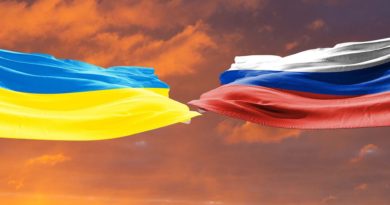Why Did Ukraine Open Its Doors to North Atlantic Treaty Organization?

All Global Research articles can be read in 51 languages by activating the Translate Website button below the author’s name (only available in desktop version).
To receive Global Research’s Daily Newsletter (selected articles), click here.
Click the share button above to email/forward this article to your friends and colleagues. Follow us on Instagram and Twitter and subscribe to our Telegram Channel. Feel free to repost and share widely Global Research articles.
Big Tech’s Effort to Silence Truth-tellers: Global Research Online Referral Campaign
***
Russia’s President Vladimir Putin surprised the world on February 24, 2022 by unreservedly launching a full-scale ‘special military operation’ in the former Soviet Republic of Ukraine which attained its independence after the sudden collapse of the Soviet era. It has maintained its independence ever since. By this historical collapse, Ukraine and all other republics including Russia have the legitimate right to their territorial integrity and sovereignty. Historically, Ukraine was only part of the Soviet Union which collapsed in December 1991.
In his speech at the Russian Federation Security Council at the Kremlin on February 21, 2022, Putin made it clear the long-standing confrontation between the Kiev officials and the people living on Eastern territory, the republics of Donbass, Donetsk and Lugansk. People in these republics were been attacked, deprived of basic amenities and their basic human rights violated. Based on those unfolding developments, and worse, the package of measures included in the Minsk Agreements would not get implemented.
Then the transcript of Putin’s speech, announcing ‘special military operation’ in Ukraine on February 24, established the position it was strictly in “accordance with Article 51, part seven of the UN Charter, with the approval of the Federation Council of Russia and pursuant to the Federal Assembly, on February 22, Russia ratified treaties of friendship and mutual assistance with the Donetsk People’s Republic and the Luhansk People’s Republic.”
Putin was very emphatic with his words and phrases.
“I made a decision to conduct a special military operation. Its goal is to protect people who have been abused by the genocide of the Kyiv regime for eight years. And to this end, strive for the demilitarization and denazification of Ukraine, as well as bringing to justice those who committed numerous bloody crimes against civilians, including citizens of the Russian Federation.”
But Putin invincibly stressed, at the same time, that the plan was not to occupy Ukraine. He said
“Our plans do not include the occupation of Ukrainian territories. We are not going to impose anything on anyone by force. At the same time, we hear more often lately from the West that documents signed by the Soviet totalitarian regime that fixed the results of the Second World War should not be implemented.”
The results of the Second World War, as well as the sacrifices made by our people on the altar of the victory of Nazism are sacred, but this does not contradict the high values of human rights and freedoms based on the realities that have developed during all post-war decades, according to Putin’s interpretation.
That however, in another address on the day of ‘special military operation’ Putin explained that NATO’s eastward expansion the situation for Russia has been becoming worse and more dangerous by the year. Moreover, NATO leadership has been blunt in its statements that they needed to accelerate and step up efforts to bring the alliance’s infrastructure closer to Russia’s borders. In other words, they have been toughening their position.
“We cannot stay idle and passively observe these developments. This would be an absolutely irresponsible thing to do for us. Any further expansion of the North Atlantic alliance’s infrastructure or the ongoing efforts to gain a military foothold of the Ukrainian territory are unacceptable for us. For the United States and its allies, it is a policy of containing Russia, with obvious geopolitical dividends,” he pointed out in that address to the natin and the world.
Therefore in a context, the purpose of this operation is to protect people who have been facing humiliation and genocide perpetrated by the Kiev regime. To that end, Russia seeks to demilitarize and denazify Ukraine, as well as bring to trial those who perpetrated numerous bloody crimes against civilians, including against citizens of the Russian Federation.
“It is not our plan to occupy the Ukrainian territory. We do not intend to impose anything on anyone by force. At the same time, we have been hearing an increasing number of statements coming from the West that there is no need any more to abide by the documents setting forth the outcomes of World War II, as signed by the totalitarian Soviet regime. How can we respond to that?” he asked rhetorically.
The outcomes of World War II and the sacrifices Russian people had to make to defeat Nazism are sacred. This does not contradict the high values of human rights and freedoms in the reality that emerged over the post-war decades. This does not mean that nations cannot enjoy the right to self-determination, which is enshrined in Article 1 of the UN Charter.
Russia is constantly reclaiming its territories. Crimea and Sevastopol were taken over by Russia. Over these years, Putin has also attempted to explain that back in 2014, Russia was obliged to protect the people of Crimea and Sevastopol. The people of Crimea and Sevastopol made their choice in favour of being with their historical homeland, Russia.
Putin did not miss words by indicating clearly that the current events have nothing to do with a desire to infringe on the interests of Ukraine and the Ukrainian people. They are connected with the defending Russia from those who have taken Ukraine hostage and are trying to use it against Russia and Russian people. That is why, however hard this may be, Russian military understands to work together, to turn the tragic page without allowing anyone to interfere in the internal affairs and fighting for the common future. In other words, Russia plays the ability to quickly adapt to constant change, maintain social cohesion, and readiness to consolidate and summon all the available forces in order to move forward, for independence and sovereignty and the Motherland.
Part II: Putin told the Russians and the world that Russia’s initial plans do not include the occupation of Ukrainian territories. Now, Putin claims Ukraine inseparable from Russia. Further to all diverse developments, it is necessary to remind that in October 2022, the President as the Supreme Commander-in-Chief signed the Law On the Ratification of the Treaty between the Russian Federation and the Autonomous Republics of Donbass, Donetsk, Kherson and Lugansk and Zaporozhye on the accession to the Russian Federation. These autonomous republics are considered now as indivisible part of the Russian Federation.
In an extensive, wide-ranging interview with American journalist Tucker Carlson in February 2024, Putin used the chance to shape the information environment especially to the West, gave a complete insight into the history of Ukraine, how it was created and became part of the Soviet Union. Invariably, it was simply repetition of the longstanding Kremlin’s talks about Russia’s full-scale invasion of Ukraine for the US audience. Media reports indicated there were more 100 million viewers.
In any case, Putin’s re-stated his position clearly. He emphasized that Ukraine must necessarily be part of Russia. And consequently, for Putin, Russia has yet to accomplish its aims in the full-scale ‘special military operation’ against Ukraine. Putin maintains that the geopolitical reasons and processes have provided grounds to pursue a complete denazification and demilitarization of Ukraine.
Highlighting the entire history before and after the 1917 revolution, the Bolsheviks et cetera, and how Russia viewed Ukraine over its history, and some recent geopolitical shifts was a complete display of excellent knowledge of history as President of the Russian Federation. But what is most essential is what next after with Russia-Ukraine conflict in the context of the emerging new world order? Does the geopolitical shit means Russia to absorb Ukraine as allegedly believe that it is necessary to wipe Ukraine from the map?
According Putin’s narratives, in 1922, when the USSR was being established, the Bolsheviks started building the USSR and established the Soviet Ukraine, which had never existed before. We are coming to the point where the Soviet Ukraine was established. Then, in 1991, the Soviet Union collapsed. And everything that Russia had generously bestowed on Ukraine was ”dragged away“ by the latter.
There is very important point of today’s agenda, after the collapse of the Soviet Union was effectively initiated by the Russian leadership. And what triggered the latest events? Firstly, the current Ukrainian leadership declared that it would not implement the Minsk Agreements, which had been signed after the events of 2014, in Minsk, where the plan of peaceful settlement in Donbass was set forth.
In the first place, the then Russian leadership believed that the fundamentals of the relationship between Russia and Ukraine were: in fact, a common language — more than 90 percent of the population there spoke Russian, common culture, common history, common faith; co-existence within a single state for centuries and deeply interconnected economies.
The fundamental conditions are there. Putin thinks how Ukraine’s territory has been developed, what kind of relations there were with Russia. As sovereign Ukraine, which gained its independence as a result of the Declaration of Independence. It should remain as a neutral state, and in 2008 why it suddenly open the doors or gates to North Atlantic Treaty Organization (NATO)? How could Russia not express concern over what was happening? From this standpoint, it was indeed a colossal mistake. This is the simple point of the disagreement. “But we never agreed to NATO’s expansion and moreover we never agreed that Ukraine would be in NATO. Oh, come on! This is not how and what we agreed.” the key message in the February interview made by American journalist Tucker Carlson with Vladimir Putin, President of the Russian Federation.
*
Note to readers: Please click the share button above. Follow us on Instagram and Twitter and subscribe to our Telegram Channel. Feel free to repost and share widely Global Research articles.
Kester Kenn Klomegah, who worked previously with Inter Press Service (IPS), Weekly Blitz and InDepthNews, is now a regular contributor to Global Research. He researches Eurasia, Russia, Africa and BRICS. His focused interest areas include geopolitical changes, foreign relations and economic development questions relating to Africa. As a versatile researcher, he believes that everyone deserves equal access to quality and trustworthy media reports.
Featured image is from the author


